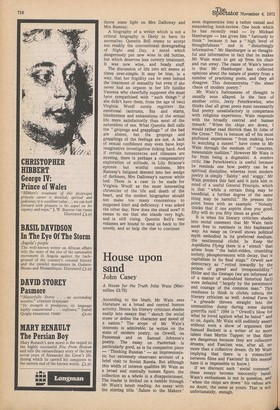House upon sand
John Casey
A House for the Truth John Wain (Macmillan £3.75) According to the blurb, Mr Wain sees literature as a broad and central human activity. Hence his literary criticism shades easily into essays that "sketch the social scene or define the character and mood of a nation." The scope of Mr Wain's interests is admirable: he writes on the state of modern poetry, on Orwell, on Pasternak and on Samuel Johnson's poetry. The essay on Pasternak is particularly good, as is its companion piece — Thinking Russian' — an impressionistic but extremely observant account of a brief visit to Soviet Russia. But although this width of interest qualifies Mr Wain as a broad and centrally human figure, the collection as a whole is a disappointment. The reader is invited on a ramble through Mr Wain's latest reading. An essay with the stirring title Salute to the Makers' soon degenerates into a rather casual and meandering book-review. One book which he has recently read — by Michael Hamburger — has given him "furiously to think" because it has a "high level of thoughtfulness" and is "disturbingly informative." Mr Hamburger is so thoughtful and informative in fact that he makes Mr Wain want to get up from his chair and run away. The cause of Wain's terror is that Mr Hamburger has collected opinions about the nature of poetry from a number of practising poets, and they all disagree. This demonstrates "the sheer chaos of modern poetry."
Mr Wain's furiousness of thought is usually soon allayed. In the face of another critic, Jerzy Peterkiewicz, who thinks that all great poets must necessarily find poetry unsatisfactory in comparison with religious experience, Wain responds with the broadly central and human remark: "When the chips are down, I would rather read Herrick than St John of the Cross." This is because all of his most profound experiences "from making love to watching a sunset" have come to Mr Wain through the medium of "concrete, measurable realities." However Mr Wain is far from being a dogmatist. A sombre critic like Peterkiewicz is useful because he reminds one how poetry can be a spiritual discipline, whereas most modern poetry is simply ' flabby ' and soggy.' Mr Wain ponders this fact and it puts him in mind of a useful General Principle, which is that "while •a certain thing may be beneficial, a further degree of the same thing may be harmful." He presses the point home with an example: "Nobody thinks that if one aspirin does you good, fifty will do you fifty times as good."
It is when his literary criticism shades into social comment that Mr Wain feels most free to ruminate in this haphazard way. An essay on Orwell shows political myth embodied in its preferred medium, the sentimental cliché. In Keep the Aspidistra Flying there is a ' stench ' that arises from "the habit-ridden, crumbling society, phosphorescent with decay, that is capitalism in its final stage." Orwell saw democracy as "rotted inwardly by the poison of greed and irresponsibility." Hitler and the Gestapo (we are informed as of a matter of undoubted historical fact) were defeated "largely by the persistence and courage of the common man." This readiness to think in cliches infects the literary criticism as well. Animal Farm is "a grenade thrown straight into the ammunition dump during some daring guerrilla raid." 1984 is " Orwell's blow for what he loved against what he hated" and so on. Again, Mr Wain will suddenly assert without even a show of argument that Samuel Beckett is a writer of no more talent than Martin Tupper; or that films are dangerous because they are collective dreams, and Fascism was, after all, no more than a collective dream. (Is Mr Wain implying that there is a connection between films and Fascism? In this mental haze it is impossible to know.) If we discount such social comment' these essays become innocently banal. Wain's enthusiasm is not in question, and 'when the chips are down' his values are, no doubt, the same as yours. That is not, unfortunately, enough.








































 Previous page
Previous page